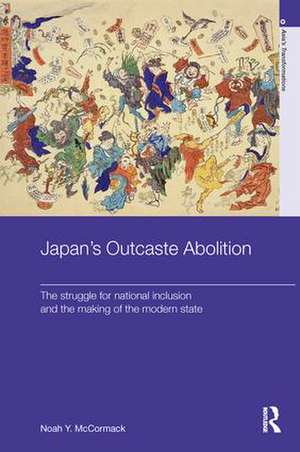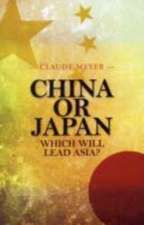Japan's Outcaste Abolition: The Struggle for National Inclusion and the Making of the Modern State: Asia's Transformations
Autor Noah Y. McCormacken Limba Engleză Paperback – 20 dec 2016
This book begins by examining the origins and evolution of the outcaste groups within the Tokugawa status order. It then looks into the complex processes leading up to the abolition of outcaste status and the institution of legal equality in 1871 under the Meiji regime, and analyzes subsequent practices and theories of social discrimination against firstly ‘former outcastes’ and ‘New Commoners’ and then ‘Burakumin’. Finally, it analyses the tactics and strategies of liberation adopted at local and national levels by anti-discrimination movements in Meiji Japan.
Detailing the history of early-modern Japanese outcastes into the post-abolition era, Japan’s Outcaste Abolition explores the dynamics of national inclusion, social exclusion, and the making of disciplined modern subjects. It will therefore be of great interest to students and scholars of Japanese history, culture and society, social history and Asian studies.
| Toate formatele și edițiile | Preț | Express |
|---|---|---|
| Paperback (1) | 489.26 lei 6-8 săpt. | |
| Taylor & Francis – 20 dec 2016 | 489.26 lei 6-8 săpt. | |
| Hardback (1) | 1055.69 lei 6-8 săpt. | |
| Taylor & Francis – 19 iul 2012 | 1055.69 lei 6-8 săpt. |
Din seria Asia's Transformations
-
 Preț: 282.38 lei
Preț: 282.38 lei -
 Preț: 267.92 lei
Preț: 267.92 lei -
 Preț: 341.33 lei
Preț: 341.33 lei - 18%
 Preț: 1220.46 lei
Preț: 1220.46 lei -
 Preț: 447.51 lei
Preț: 447.51 lei - 18%
 Preț: 1060.87 lei
Preț: 1060.87 lei -
 Preț: 489.44 lei
Preț: 489.44 lei -
 Preț: 446.58 lei
Preț: 446.58 lei - 18%
 Preț: 1003.43 lei
Preț: 1003.43 lei -
 Preț: 488.29 lei
Preț: 488.29 lei -
 Preț: 449.41 lei
Preț: 449.41 lei - 28%
 Preț: 822.54 lei
Preț: 822.54 lei - 18%
 Preț: 1225.22 lei
Preț: 1225.22 lei -
 Preț: 416.44 lei
Preț: 416.44 lei - 18%
 Preț: 1389.36 lei
Preț: 1389.36 lei - 18%
 Preț: 1062.98 lei
Preț: 1062.98 lei -
 Preț: 483.49 lei
Preț: 483.49 lei -
 Preț: 452.31 lei
Preț: 452.31 lei -
 Preț: 416.22 lei
Preț: 416.22 lei -
 Preț: 438.14 lei
Preț: 438.14 lei -
 Preț: 411.42 lei
Preț: 411.42 lei -
 Preț: 443.65 lei
Preț: 443.65 lei - 18%
 Preț: 1055.51 lei
Preț: 1055.51 lei - 18%
 Preț: 1054.27 lei
Preț: 1054.27 lei -
 Preț: 445.38 lei
Preț: 445.38 lei - 25%
 Preț: 573.10 lei
Preț: 573.10 lei - 28%
 Preț: 821.46 lei
Preț: 821.46 lei - 18%
 Preț: 1337.43 lei
Preț: 1337.43 lei - 18%
 Preț: 1055.51 lei
Preț: 1055.51 lei - 18%
 Preț: 1059.45 lei
Preț: 1059.45 lei - 15%
 Preț: 547.89 lei
Preț: 547.89 lei -
 Preț: 450.15 lei
Preț: 450.15 lei - 18%
 Preț: 1110.77 lei
Preț: 1110.77 lei -
 Preț: 411.42 lei
Preț: 411.42 lei -
 Preț: 453.96 lei
Preț: 453.96 lei - 24%
 Preț: 337.22 lei
Preț: 337.22 lei - 28%
 Preț: 186.91 lei
Preț: 186.91 lei
Preț: 489.26 lei
Nou
Puncte Express: 734
Preț estimativ în valută:
93.63€ • 101.67$ • 78.65£
93.63€ • 101.67$ • 78.65£
Carte tipărită la comandă
Livrare economică 22 aprilie-06 mai
Preluare comenzi: 021 569.72.76
Specificații
ISBN-13: 9781138629066
ISBN-10: 1138629065
Pagini: 216
Dimensiuni: 156 x 234 x 12 mm
Greutate: 0.45 kg
Ediția:1
Editura: Taylor & Francis
Colecția Routledge
Seria Asia's Transformations
Locul publicării:Oxford, United Kingdom
ISBN-10: 1138629065
Pagini: 216
Dimensiuni: 156 x 234 x 12 mm
Greutate: 0.45 kg
Ediția:1
Editura: Taylor & Francis
Colecția Routledge
Seria Asia's Transformations
Locul publicării:Oxford, United Kingdom
Public țintă
Postgraduate and UndergraduateCuprins
1. Outcaste Status after Equality 2. A Status Society 3. Outcaste Status 4. Rationality, Enlightenment and Outcaste Abolition 5. Defiled Bloodlines 6. Foreign Origins as Stigma 7. The Stigma of Place 8. Assimilation as Liberation 9. Conclusion
Notă biografică
Noah Y. McCormack is an Associate Professor in the Department of International Relations, Kyoto Sangyo University, Japan.
Recenzii
"the work provides a compelling examination of the role of domestic and international politics in changing Japan’s status hierarchy, particularly for those on the margins of society. It would be a valuable resource not just for historical studies of marginality, but for anyone, from advanced undergraduates on, in understanding how policies that are derived from creating modern nation state (such as ideologies of commonality and equality) are intertwined with changing beliefs and practices." Christopher Bondy, International Christian University, Social Science Japan Journal
Descriere
This book begins by examining the origins and evolution of the outcaste groups within the Tokugawa status order. It then looks into the complex processes leading up to the abolition of outcaste status and the institution of legal equality in 1871 under the Meiji regime, and analyzes subsequent practices and theories of social discrimination against firstly ‘former outcastes’ and ‘New Commoners’ and then ‘Burakumin’. Finally, it analyses the tactics and strategies of liberation adopted at local and national levels by anti-discrimination movements in Meiji Japan.











